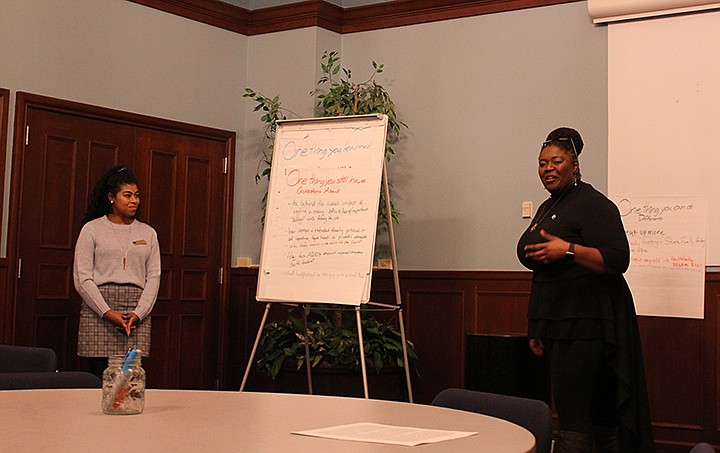About a dozen Westminster College students gathered to honor the legacy of Martin Luther King Jr. on Friday evening.
The event, originally scheduled for Martin Luther King Jr. Day but rescheduled due to poor weather, featured speaker Nia Smith.
"Dr. Martin Luther King Jr. had more than a journey - he had an assignment from God, and it started long before he even entered this Earth," Smith said.
Members of King's family, including his father and maternal grandfather, helped build the civil rights movement King would come to embody, Smith said.
"One thing about Dr. King is that he came from a long lineage of Baptist preachers dating back to his maternal great-grandfather Willis Williams," she said. "He was what people would define as an old slavery-time preacher."
King's grandfather, A.D. Williams, was also a Baptist preacher who, as a child, would preach to fellow sharecropper children. As an adult, his leadership in the church led A.D. Williams to seek out a formal education at Morehouse College, the school his son-in-law the Rev. Michael King Sr. and grandson would later attend.
Williams helped organize the National Baptist Convention, the Georgia Equal Rights League and a local branch of the NAACP. Williams also played a role in convincing the NAACP to hold its national convention in the South for the first time in 1920.
"I'm sharing these things with you to let you know that prior to the birth of Dr. King, his grandfather was already planning the groundwork for the things that his grandson would eventually do," Smith said.
Michael King, another Baptist preacher, married Williams' daughter Alberta Christine Williams.
"Both preached a social gospel of Christianity that combined a belief in personal salvation with the need to apply the teachings of Jesus to their black congregations," Smith said.
Michael King was also a leader in the fight for civil rights.
"Dr. King's father not only engaged in personal acts of political dissent, such as riding the whites-only elevator at city hall to reach the voter registration office, but he was also a leader of organizations such as the Atlanta Civic and Political League and the National Association for the Advancement of Colored People," Smith said.
A major theme of Smith's speech was the link between the past, the present and the future. She urged her audience to look beyond King's famous "I Have A Dream Speech."
"That day in Washington, D.C., thousands gathered to march for jobs and freedom, and thousands if not millions are still marching for jobs and freedom today," she said.
As a teacher, Smith taught at a school in the suburbs of St. Louis where 100 percent of the students were on free and reduced-price lunch, and 98 percent were black.
"Prior to working there, I was in the opposite side of St. Louis County in a more affluent district," she said. "We bused students in to give that district a 12 percent minority population."
The segregation and discrimination King fought to overcome still exists, Smith said.
"We want to believe that our communities and schools are integrated, but are they truly integrated?" she asked.
Smith called on her audience to examine their pasts and build on King's legacy.
"Each and every person in this room has the power to do the same," she said.

